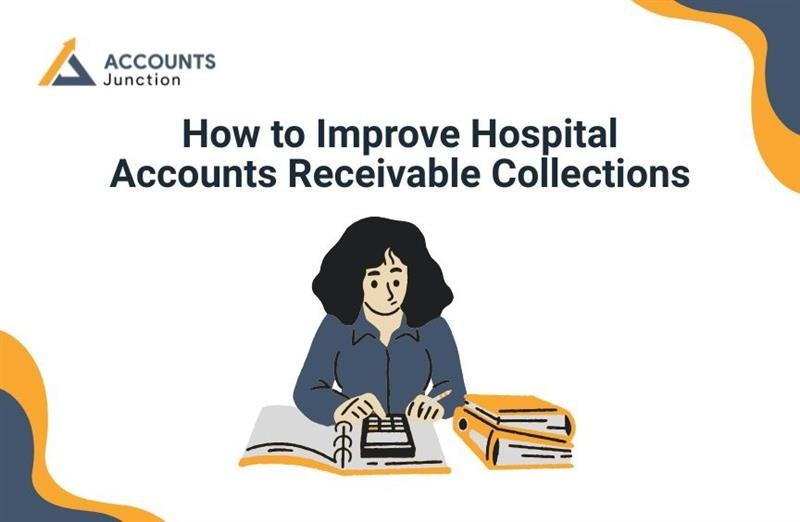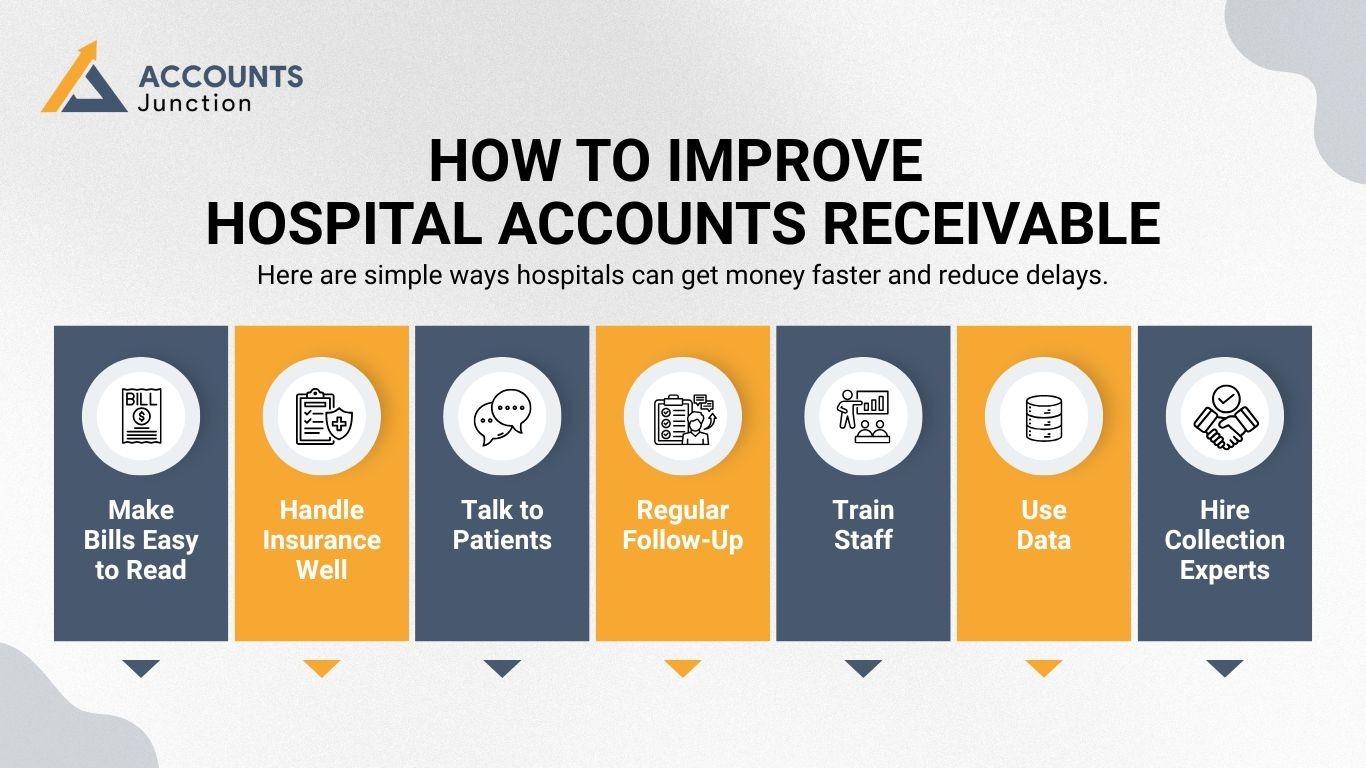
How to Improve Hospital Accounts Receivable Collections
Hospital accounts receivable is the money a hospital is owed for care it gave. This comes from patients, insurance, or other payers. Managing these funds well is key to the hospital’s cash flow and daily work. Slow or poor collections can stop the hospital from paying staff, fixing tools, or giving care. By checking bills, keeping track of payments, and reminding patients or insurers about unpaid money, hospitals can get cash faster.
In this guide, we will share simple ways to improve hospital accounts receivable collections. These tips will help hospitals collect money faster while keeping patients happy.
What is Hospital Accounts Receivable?
Hospital accounts receivable is the money the hospital is owed for care it has given. This money comes from patients or their insurance. It includes bills for visits, tests, and care. Every unpaid bill adds to accounts receivable. Tracking it helps the hospital know what is due and when it will get paid. Good management of accounts receivable keeps the hospital running, helps pay staff on time, and ensures supplies and care are available.
Why Hospital Accounts Receivable Matters
- Cash Flow: Fast pay helps the hospital pay staff and get items.
- Smooth Work: Fewer past-due bills make work easy for staff.
- Patient Trust: Clear bills help people see what to pay and when.
- Plan Budget: Knowing what money will come helps the hospital plan.
- Avoid Loss: Getting bills paid on time reduces money problems.
- Less Work: Good tracking cuts errors and saves time.
Common Problems in Hospital Accounts Receivable
Many hospitals face delays in getting money. Knowing the problems helps fix them and keeps cash flow smooth.
1. Hard-to-Read Bills
Bills with too many numbers or codes confuse patients. Hard bills slow pay and take staff time to explain.
2. Slow Insurance Claims
Insurance takes time. Denied or lost claims delay cash. Staff must track claims to get money fast.
3. Poor Patient Contact
If patients get no clear info, they may pay late or call often for help.
4. Old Manual Work
Paper files or hand bills add mistakes. Wrong names, dates, or sums block pay.
5. Missing Follow-Up
Unpaid bills that are not tracked can get lost, leaving cash late.
6. Wrong Data Entry
Errors in names or sums stop pay and waste staff time.
7. No Payment Options
A few ways to pay make patients wait. More options bring cash fast.
How to Improve Hospital Accounts Receivable
Here are simple ways hospitals can get money faster and reduce delays.
1. Make Bills Easy to Read
Clear bills help patients pay on time and reduce confusion.
-
Break Down Charges
Show each service and its cost. Add short notes to explain extra charges. Include phone or email for questions. When patients understand what they owe, they are more likely to pay quickly.
-
Go Digital
Use software to send bills and track payments. Digital bills cut mistakes, let staff see who paid or not, and speed up follow-ups. Automated alerts can flag unpaid bills so nothing is missed.
Short explanations for codes, tests, or meds help patients know why costs appear. This prevents delays and reduces calls for clarification.
2. Handle Insurance Well
Insurance affects hospital accounts receivable a lot and can slow cash flow.
-
Check Coverage Early
Verify insurance before care. Knowing coverage helps avoid denied claims and unexpected bills for patients.
-
Track Claims
Use software to watch pending or denied claims. Staff can correct errors or submit missing info fast.
-
Communicate With Insurers
Call or email insurers if the info is missing or unclear. Fast communication keeps claims moving and speeds payment.
-
Keep Records
Keep simple logs of claim status, contact dates, and responses. This prevents delays from lost or missed claims.
3. Talk to Patients
Good patient contact improves collection rates and reduces confusion.
-
Explain Bills
Tell patients what they owe, how to pay, and due dates. Give clear examples if multiple services were billed.
-
Make Payment Easy
Offer online pay, cards, or small installment plans. Flexible options help patients pay on time and reduce late accounts.
-
Send Friendly Reminders
Gentle reminders by email, phone, or text keep payments on schedule. Personalized reminders make patients more likely to respond.
-
Provide Support
Have staff ready to answer patient questions about bills. Quick support builds trust and helps collect money faster.
4. Regular Follow-Up
Check unpaid bills often.
-
Send Reminders
Emails or SMS for due bills help patients remember.
-
Prioritize Big Accounts
Focus first on large or old unpaid bills.
5. Train Staff
Trained staff improve hospital accounts receivable.
-
Teach Billing Skills
Show staff how to manage claims, answer questions, and use software.
-
Set Goals
Clear targets help staff stay on track and reduce unpaid bills.
6. Use Data
Data helps track and improve accounts receivable.
- Watch Key Numbers
Look at the days' unpaid bills, denial rates, and payments received. - Act on Data
Change billing or follow-up processes based on trends.
7. Hire Collection Experts
Sometimes, outside help speeds up accounts receivable collections.
- Experts Help
Special teams know insurance and patient collections. - Focus on Care
Hospital staff can focus on patients while experts handle bills efficiently.
Benefits of Better Hospital Accounts Receivable
-
More Cash
Money comes in fast for staff pay, supplies, and tools. Quick collections mean the hospital has funds to run all services without delays. It helps keep care smooth and avoids shortfalls in day-to-day work.
-
Less Work
Automation, software, and outside help cut the staff’s load. Staff spend less time chasing bills or fixing errors. This frees them to focus on patient care and makes work less stressful and clearer.
-
Happy Patients
Simple bills and easy pay options build trust. Patients can see what they owe and pay fast without stress. Clear bills reduce confusion and make patients feel the hospital cares about them.
-
Plan Budget
Predictable money helps the hospital plan new services and buy items needed for care. Knowing expected payments makes it easier to manage staff, tools, and supplies without surprises or extra cost.
-
Fewer Errors
Good hospital accounts receivable systems cut mistakes in bills and records. Fewer errors mean less confusion for patients and staff, faster pay, and less work fixing past mistakes.
-
Strong Finances
Collecting money on time reduces the need to borrow funds. The hospital can save and spend wisely. Strong finances mean better care, more staff, and reliable tools for patients.
💡 Need help managing hospital accounts receivable?
Accounts Junction helps hospitals speed up collections, reduce claim delays, and improve cash flow.
Contact us today to simplify your billing and boost your financial performance.
Mistakes to Avoid
- Not explaining bills to patients.
- Using only manual work.
- Forgetting to follow up.
- Ignoring denied claims.
Future of Hospital Accounts Receivable
- AI Tools: Predicts late payments and sends reminders.
- Easy Bills: Focus on short, clear, online bills.
- Cloud Systems: Real-time tracking from anywhere.
Conclusion
Effective hospital accounts receivable work helps get cash faster, cut errors, and keep daily work smooth. Clear bills, easy payment ways, quick follow-ups, and skilled staff all help hospitals get money on time. At Accounts Junction, we help hospitals track unpaid bills, fix plan issues, and speed up collections. Our services save staff time, reduce stress, and keep funds steady so hospitals can focus on care. Working with Accounts Junction makes collections simple, boosts finances, and helps give better care.
💡 Want to improve your hospital’s cash flow?
Accounts Junction helps healthcare providers streamline billing, reduce payment delays, and collect receivables faster.
Get in touch with us today to make your collections process efficient and stress-free.
FAQs
1. What is hospital accounts receivable?
- It is the money a hospital is owed for care it gave, from patients or their plans.
2. Why do hospitals face delays in payments?
- Delays happen when bills are hard to read, plans take too long, or checks are not done.
3. How can hospitals make bills easy to read?
- Use short words, list each care and cost, and give a phone number or email for help.
4. How can plan bills be handled faster?
- Check the plan before care, track unpaid bills, and call the plan if there are issues.
5. How do reminders help collections?
- Gentle emails, calls, or texts keep bills on patients’ minds and help avoid late pay.
6. Why is staff training important for collections?
- Staff who know billing, tracking, and calls reduce mistakes and get money in fast.
7. When should hospitals get outside help?
- If staff are busy or bills lag, experts can handle collections while staff focus on care.
8. What is the future of hospital collections?
- AI, online tools, and cloud systems help predict late payments and speed up cash flow.

